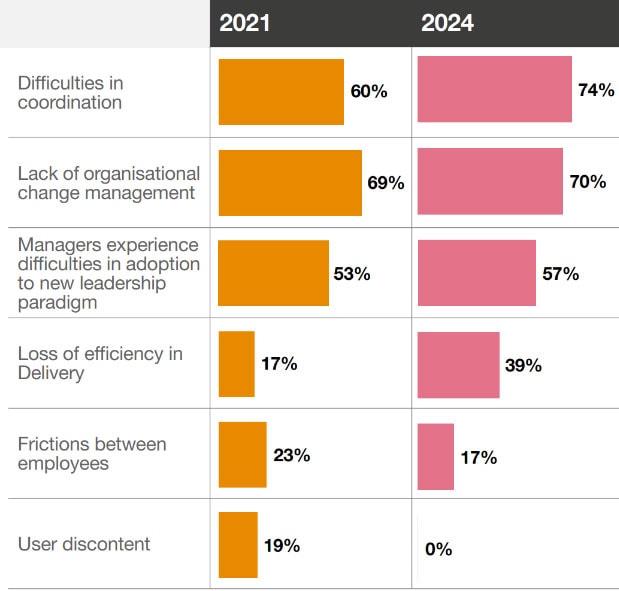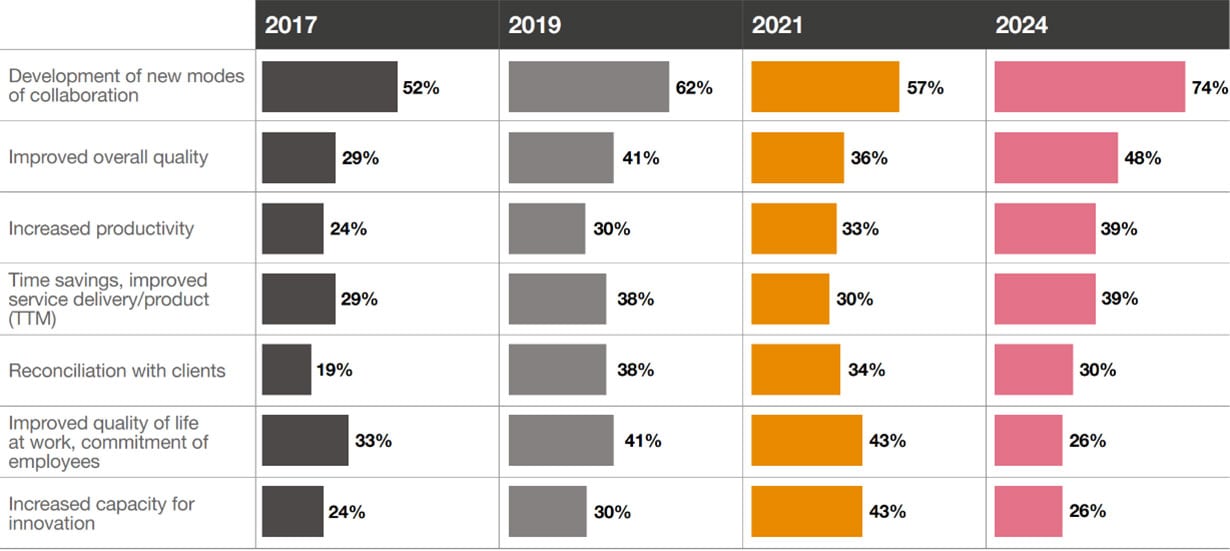During the first quarter of 2024, PwC Luxembourg launched the fourth edition of the Agile Survey, as a follow-up to previous editions from 2017, 2019, and 2021. The survey was based on a set of questions originally developed by PwC Luxembourg and PMI Luxembourg Chapter and was conducted using a questionnaire of multiple-choice and open-ended questions, which allowed us to obtain a better understanding of the current state of the Agile methodology in the Grand Duchy. This white paper aims to examine how the Agile approach has been consolidated in organisations’ core practices and how it represents a promising tool for prompting digital transformation in Luxembourg.
Agile Survey 2024
A paradigm shift in the Grand Duchy’s organisational culture
Key findings
Keywords for Agile
Today’s business landscape has proven that following ultra-defined and exact instructions is very operationally difficult. The survey respondents reaffirm this idea and consider that ‘mindset’ (70%) and ‘way of self organisation’ (39%) are among the two best descriptions of Agile.

Note: Multiple-choice question. - Source: PwC Global AWM & ESG Research Centre
Organisational functions sponsoring Agile
Although senior management is sometimes more conservative when taking structural risks, it seems to be gaining a protagonist role when sponsoring Agile (32% in 2019 and 48% in 2024). This represents an exceptional opportunity for companies looking to foster business-IT collaboration.

Note: Multiple-choice question. 2017 edition data excluded due to methodological differences. - Source: PwC Global AWM & ESG Research Centre
What are the main negative feedback received related to the set-up of Agile?

Note: Multiple-choice question. - Source: PwC Global AWM & ESG Research Centre
Working through iteration phases rests upon a radical paradigm shift that requires highly-skilled leaders who can coordinate dozens, if not hundreds, of multi-disciplinary teams. Unsurprisingly, companies in Luxembourg see ‘difficulties in coordination’ as the first negative point to adopting Agile. Aditionally, ‘lack of organisational change management’ and ‘managers experience difficulties in adoption to new leadership paradigm’ are key potential drawbacks.
Positive feedback received related to the set-up of Agile
Regardless of the challenges organisations could encounter when using Agile, there are many ways to create long-term value after using it. Therefore, 74% of respondents consider the 'development of new collaboration modes' as the main positive outcome they have experienced with Agile

Note: Multiple-choice question. - Source: PwC Global AWM & ESG Research Centre
Conclusion
Agile challenges traditional organisational cultures. By embracing this methodology, companies can empower individuals, build trust among collaborators, enhance productivity and efficiency, and face the challenges that today’s business landscape constantly encounters. What matters in today’s business landscape is no longer following rigid hierarchies or unquestionable instructions but prioritising communities, betting on quality, and preparing for an unsteady environment.
Agile Survey 2024
A paradigm shift in the Grand Duchy’s organisational culture
Contact us
Thierry Kremser
Advisory Partner, Deputy Advisory & Technology Leader, PwC Luxembourg
Tel: +352 49 48 48 2269
Krzysztof Jaros-Kraszewski
Advisory Director, Technology, PwC Luxembourg
Tel: +352 62133 42 30
Partner, Global AWM Market Research Centre Leader, PwC Luxembourg
Tel: +352 49 48 48 2191









